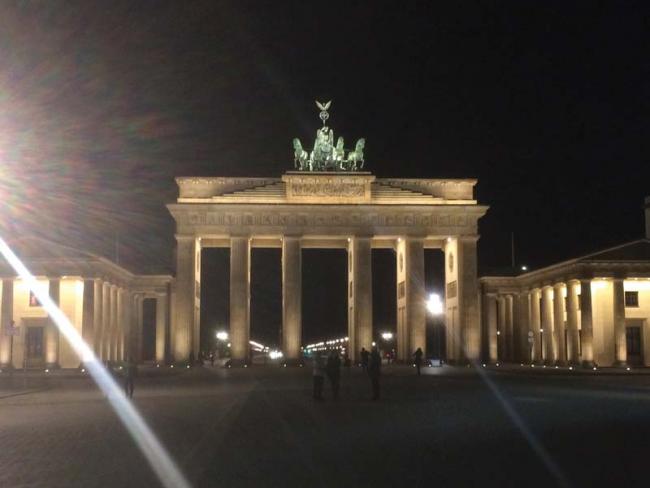
The Brandenburg Gate, Berlin. Symbol of a united Germany - and a European Union dedicated to exploitation. Photo Workers
The parliamentary parties are for saving capitalism and enhancing its profits. And the EU is the instrument designed for this – to enforce the free (for capitalism) movement of labour, capital and services…
As WORKERS went to press, there had been hardly a mention in this election campaign of foreign policy – let alone of the profoundly adverse effects of Britain’s membership of the European Union.
It is our working class who feel the brunt of its actions to build profits while suppressing wages and living standards. Now, in its quest to do so much more efficiently, the EU reaches out to that empire of capitalism, the USA, to find legal chains to bind us into its scheme – through the mechanism of the Trans-Atlantic Trade and Investment Partnership (TTIP).
As we have noted in previous issues of Workers there is a significant growth in awareness among organised workers of what this treaty means for Britain and the urgent need to oppose it.
The EU itself has, over decades, imposed multiple “directives” and regulations on workers in an attempt to prevent us from defending our pay and conditions. It has enforced privatisation of public services, overridden our laws, attempted to pull the country apart, and undermined our national sovereignty.
Signing up to TTIP would be a major reinforcement of this attack. By far the best solution would be to reassert our national sovereignty – in a Britain that has been forged by workers’ unity – and abandon the sinking EU ship. That’s why workers should take the lead in demanding a vote on this in a referendum.
The embrace of the lenders
The ongoing crisis in Greece shows clearly the nature of the EU as an exploitative capitalist block. An unprepared Greece was forced into the eurozone with catastrophic consequences, with its GDP falling by a third, unemployment rising to 27 per cent (for youth it’s over 60 per cent) and a third of its people classified as “in poverty”.
Of the 230 billion euro bailout only 27 billion went into the Greek economy, while over 200 billion had to go to repay German, French, US and British banks. In order to generate funds to make these repayments, the EU insisted on a guarantee that Greece create a government surplus of 4.5 per cent of GDP in 2015-16.
Methods used had to satisfy the lenders – the European Central Bank (ECB), the International Monetary Fund (IMF) and the EU Commission. Despite brave words there was no way out for the Greek government from the clutches of this “troika”.
The Greek prime minister pointed out they were “holding a noose around our neck”.
The ECB went on to stop Greece selling treasury bills to Greek banks as well as withholding previously agreed credits.
Awareness of the nature of the EU and lack of control over their own economy has spread rapidly in Greece – with strong opposition to impoverishment, privatisation of state services and erosion of collective bargaining. Yet the flaw in this scenario is that they remain wedded to the EU and its currency, an external institution representing the interests of finance capitalism.
The Spanish experience
Similar tales of woe can be found in Spain, Portugal and Ireland that should reinforce our determination to abandon the EU and its diktats. In Spain we find the steady erosion of its traditional agricultural and manufacturing industries since it joined the EU in 1986, combined with rising unemployment. Among youth it has now risen to over 50 per cent.
Spain’s financial crisis from 2008 was worsened by collapse in a rampantly speculative building market. Big landowners had taken EU subsidies on condition of cutting back basic commodities such as milk and had fallen in with the multinational supermarket business of cheap, low quality produce. Its manufacturing was decimated by German competition.
Privatisation right across utilities and transport, lower pensions and proposed retirement at 70, increased tuition fees and cuts in funding of local services are some of the results.
In Portugal, a dictatorship had been overthrown in 1985, but the social advances and optimism created then have been gradually undermined.
Unemployment, just over 4 per cent in 1993, is now over 17 per cent with the figure for youth at over 40 per cent. Wages continue to fall as job insecurity rises.
There was no consultation with the Portuguese people as the Socialist Party took the country into the EU then the euro. They had to resign after signing an “austerity” package with the “troika” – leaving a right-wing coalition to enforce the cuts and privatisations.
ʻOf the 230 billion euro Greek bailout, more than 200 million went to repay German and other banks.ʼ
As for Ireland, an interesting commentary came from Patricia McKenna – chair of the Irish People’s Movement, which had led the campaign against the EU in the Irish referendum – when she spoke in Glasgow earlier this year. She “found it an irony that the parties supporting independence were also strongly supportive of the EU (which denied economic sovereignty and independence)”.
She found it very difficult to understand how people could see the EU as democratic. Most of the peoples of Europe had had no opportunity at all to vote on the key changes that had occurred over the past 20 years. The Irish people had – as a result of a clause in their written constitution – been able to do this.
On two critical occasions (on the Nice Treaty and on the Lisbon Treaty) they had voted “no”. On both occasions they had been required to vote again, under massive pressure, to give a “yes” vote. This, she said, was not what she understood as democracy.
McKenna pointed out that the unelected EU Commission and the Council of Ministers wielded such pressure that the EU parliament rarely stopped legislation in part or in whole. The EU Commission had the sole right to initiate legislation. Her country had experienced the worst emigration for many decades as well as impoverishment and privatisation.
In light of her experience of the campaigns in Ireland, she advised those in Britain fighting a referendum against the EU to demand and ensure a balance of resources and ground rules that would prevent external interference from the EU.
The parties campaigning here in Britain are weak and vacillating on this issue. Cameron’s ploy of advocating a referendum only to demand staying in the club has come unstuck. European Commission President Jean-Claude Juncker is insisting that any treaty negotiations on Britain’s relationship with the EU must be ruled out until two years after the referendum promised by David Cameron.
His chance to whitewash the EU and make it seem more acceptable is receding. Workers must step up the demand for a referendum on this – and prepare to campaign to win it. Other parties are weak on the issue. Labour, Greens and SNP are keen to criticise aspects of TTIP but ignore or make no criticism of the EU, which is pushing through its implementation.
ʻTTIP would elevate the interests of private capital.ʼ
Already we have seen the European Court of Justice (ECJ) establishing case law over several years in favour of companies using the EU-inspired free movement of labour to push down long-fought-for standards in wages and conditions. That’s why the fight for pay is on the “front line” of this struggle and its importance should be recognised and raised.
The MP Ian Davidson (leading campaigner against the euro in the 1990s) pointed out recently the important role of the ECJ. He criticised those “who denied that the EU was a capitalist institution committed to promoting a free market engineered to subordinate the collective bargaining power of working people”.
Davidson cited the ECJ as being closely connected with this process – that unlike any other court, it was in its essence political. Its decision making was not based on points of law but on the political assessment of how far a particular issue, in terms of legal outcome, would assist or not assist the “ever closer union” of the EU.
Danger
He also pointed to the danger of this process being intensified by the current negotiations by the EU on TTIP. This would further elevate the interests of private capital, in terms of legal process, over national governments and the interests of workers and consumers.
For an example of our own vulnerability, look no further than the NHS: with 75 per cent of contracts now going to the private sector under the Health and Social Care Act 2012, the NHS is in much more danger. Any attempt to reverse such legislation could face the same type of legal action as was mounted against the Slovak government’s de-privatisation attempt in 2006. Workers must consider how they would tackle such obstacles.
The bigger picture is that the eurozone as a whole is in recession, with European Central Bank forecasts of unemployment remaining at 10 per cent well into 2017. The “Fiscal Compact” of 2012 commits 27 EU countries to achieving zero deficit budgets by 2019. This will require further massive cutbacks and privatisations. That’s why recession persists.

The “internal devaluation” envisaged would result in reductions in the real costs of production for capitalism – ensuring profits and re-investment for further exploitation. And in this single market created across the EU, the many weaker economies lose out to the few stronger ones. This was disguised by bank credits until the crash came. Credit is being pumped again, making the weaker even more dependent.
Who is the creditor? Above all, within this capitalist EU system, the answer would be Germany. Speaking at a 2013 Scottish Trade Union Congress fringe meeting on the EU, Ian Davidson illustrated the controlling influence of Germany within the EU: “First, there is the Cyprus bailout. That was debated in the German Bundestag – it was not debated in the Cyprus parliament.
“The Cypriot people were presented with a fait accompli – a terrible one for their own economy and future.” Second, he said, there is the response of the people of Greece to their bailout, with 80 per cent now calling for full reparations for the damage done by Germany during World War Two, and 40 per cent ready to leave the eurozone.
Struggle
The workers of Germany itself have an illustrious history of struggle – from the attempt at revolution in 1919, through heroic resistance to Nazism, to the building of a socialist state in the east – that can enable them to fight this capitalist attack as they find themselves in the same predicaments as workers in other European countries, and here in Britain.
And it is here in Britain that an exemplary national plan should be created by workers. Let’s build a united sovereign Britain that works for our interests – to lead the way in manufacturing, energy, transport, self-sufficient agriculture and fisheries and world renowned culture.
